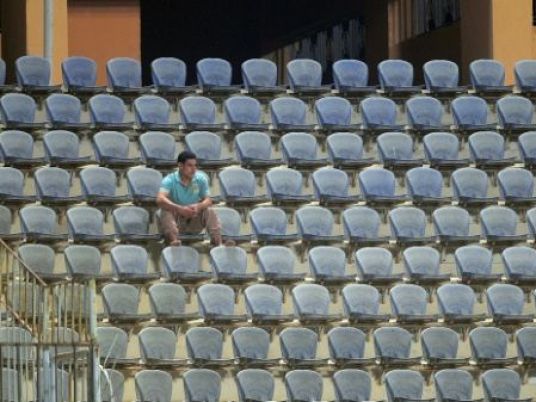
Denied entry to watch his favourite football team, Osama Gamal glumly settled on a pavement outside and followed the match live on his phone as policemen guarded the near-empty stadium.
Egypt once boasted some of the strongest teams in Africa and the Middle East, and the sport was adored by millions.
But the bloody turmoil of the past four years has not spared the world's most popular sport, which in the minds of many Egyptian fans has become synonymous with deadly riots and stampedes.
Games are now played in empty stadiums, with spectators banned.
"Although it is played for spectators, we no longer enjoy football, our only pleasure in life," said Gamal, 21.
Two editions of the Egyptian Premier League have been cancelled since the 2011 uprising that ousted longtime president Hosni Mubarak.
When the authorities did open some matches for spectators, they were marred by deadly violence.
In February, police fired tear gas at fans who tried to push their way into a Cairo stadium. Nineteen people died in the ensuing stampede.
It was the second such incident since the 2011 uprising. In the deadliest sports riot in Egypt's modern history, 72 fans were killed after a match in the canal city of Port Said in 2012.
"For the first time in my adult life, my favourite team Zamalek will win the premier league championship and we can't even celebrate," Gamal told AFP.
Last week's game between Cairo clubs El-Nasr and Zamalek — expected to win the trophy for the first time in 11 years — was attended by only a few high-profile invitees, with police outnumbering spectators, an AFP correspondent reported.
– 'Matches result in bloodshed'-
Football has always stirred passions among Egyptians, and many still accuse Mubarak of using it to distract them from the political and economic woes that marred his reign.
But that passion has turned to deadly violence in the political climate of recent years.
"I ran for my life from the teargas and chaos" that erupted during the February stampede, said lawyer Mohamed El-Arabi.
That match was among just a handful that had been open to the public, and the authorities reimposed the ban on spectators following the crush.
Sixteen defendants are on trial on charges of starting the stampede. They are accused of being members of the Ultras White Knights — hardcore Zamalek supporters — and prosecutors allege they received funds from the outlawed Muslim Brotherhood to spark the rioting.
For Egyptians football used to be a festive occasion when friends and families gathered to watch a match at homes or at stadiums.
But Ashraf El-Sherif, professor of political science at the American University in Cairo, said Egyptians' attitudes to football has changed.
"People feel that the entire process involved in these football matches results in bloodshed and chaos, so they are losing interest," he said.
The political turbulence that followed Mubarak's ouster and the overthrow of his Islamist successor, Mohamed Morsi, has deeply impacted the sport.
Morsi's toppling by the army in July 2013 polarised Egypt for months, and an ensuing government crackdown targeting his supporters left hundreds dead and thousands jailed. Jihadists have also killed scores of policemen and soldiers in retaliatory attacks.
– 'Football is dead' –
In May, a court outlawed the Ultras, who were at the forefront of protests that toppled Mubarak and have openly displayed their hostility to the police.
The national team has also suffered since Mubarak's fall, failing three times since 2011 to qualify for the African Cup of Nations it had once dominated.
"Local football no longer arouses the same passion," said Samir, a waiter in a cafe in the capital's Sayeda Zeinab district.
Behind him a match involving El-Ahly, the most popular club in Egypt, is being broadcast live on television but few seem to care.
"We have more customers when Barcelona or Real Madrid play. There are no empty chairs left then," he said.
"Football is dead in Egypt," said Sameh Mamdouh, an engineer who previously never missed a match.
"My only pleasure now is to watch European football. Everything is more sophisticated with the European championship — the competition, the performance and the audience."




